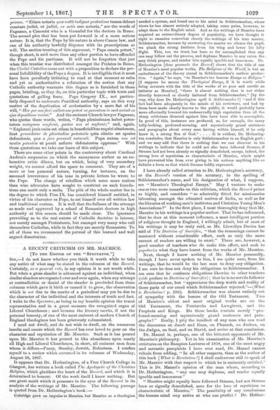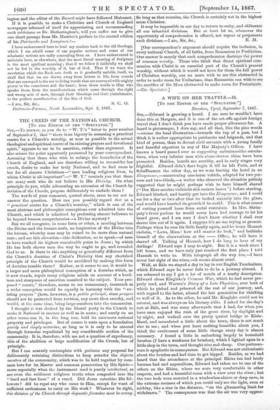A RECENT CRITICISM ON MR. MAURICE.
[To THE EDITOR OF THE "SPECTATOR."] SIR,—I do not know whether you think it worth while to take any notice of what may be stated in the columns of the Record. Certainly, as a general rule, in my opinion it is not worth while. But when a gross slander is advanced against an individual, when similar slanders are repeated over and over again, when any attempt at contradiction or denial of the slander is precluded from those columns which gave it birth or caused it to grow, the observation which is not due to the merits of a periodical may yet be due to the character of the individual and the interests of truth and fact. I write to the Spectator, as being in my humble opinion the truest representative and in a great measure the recognized organ of Liberal Churchmen ; and because the literary merits, if not the personal honesty, of one of the most eminent of modern Church of England theologians has been grievously calumniated.
I need not dwell, and do not wish to dwell, on the numerous insults and sneers which the Record has ever loved to pour on the character and reputation of Mr. Maurice. Such as it has poured upon Mr. Maurice it has poured in like abundance upon nearly all High and Liberal Churchmen, in short, all eminent men from whom it differs—Pusey, Stanley, Jowett, Robertson. I confine myself to a review which occurred in its columns of Wednesday, August 28, 1867.
It appears that Dr. Hetherington, of a Free Church College in Glasgow, has written a book called The Apologetic of the Christian Religion, which gladdens the heart of the Record, and which it is determined to honour. Of the work itself I know nothing. But one great merit which it possesses in the eyes of the Record is its analysis of the writings of Mr. Maurice. The following passage is quoted from Dr. Hetherington's book :—
Coleridge gave an impulse to Maurice, but Maurice as a theologian
needed a system, and found one to his mind in Schleiermacher, whose views he has almost entirely adopted, taking some pains, however, to adapt them to the English mind. And as the writings of Maurice have acquired an extraordinary degree of popularity, we have thought it right to examine somewhat closely the writings of his true master. Schleiermacher, because by answering the master we silence the pupil, we pluck the strong feathers from his wing and lower his lofty flight. This, too, we trust, has been so far accomplished that any one may follow out the process, and deplume Maurice to any eaten the , may think proper, and render him equally ignoble and innocuous. Dr. Hetherington [thus proceeds the Record] shows that the title of one of Maurice's moat popular works, The .Religions of the World, is but an embodiment of the theory stated in Schleiermacher's earliest produc- tion. "Again," he says, "in Maurice's too famous Essays on Religion" [I suppose he means the Theological Essays, if it is worth while being accurate with the title of the works of so poor and servile an imitator as Maurice], "there is almost nothing that is not either directly borrowed or closely imitated from Schleiermaoher," [by the way, why does Dr. Hetherington spell it Schleirmacher?] "and if this fact had been adequately in the minds of his reviewers, and had by them been made clearly known to the public, it would probably have more effectually lowered his undeservedly high reputation than all the sharp criticisms directed against him have been able to accomplish. In proof of this, instances are produced, as, for example, the many lofty-looking, profound-seeming, and mysteriously grand sentences and paragraphs about every man having within himself, if he only knew it, a strong Son of God." . . . . It is evident, Dr. Hethering- ton concludes, that Maurice is only Schleiermacher in an English garb ; and we may add that there is nothing that we can discover in his writings to indicate that he could not also have followed Strauss, if Strauss had not been already so signally demolished, except, indeed, the strong love of mysticism so characteristic of Maurice, which might have prevented him from ever giving to his notions anything like so definite a form as that which Strauss boldly expressed.
I have already called attention to Dr. Hetherington's accuracy, or the Record's version of his accuracy, in the spelling of Schleiermacher's name, and his designation of what, I suppose, are " Maurice's Theological Essays." May I venture to make one or two more remarks on this criticism, which the Record prizes so highly, and considers " so admirably fitted for missionaries labouring amongst the educated natives of India, as well as for the libraries of working men's institutes and Christian Young Men's Associations?" In the first place, I most thoroughly deny that Mr. Maurice in his writings is a popular author. That he has influenced, that he does at this moment influence, a most intelligent portion of religious thought in England, I willingly admit, but of most of his writings it may be truly said, as Mr. Llewellyn Davies has said of The Doctrine of Sacrifice, " that the reasonings cannot be mastered without considerable effort, such as only the more earnest of readers are willing to exert." There are, however, a good number of teachers who do make this effort, and seek to popularize what they have learnt from the works of Mr. Maurice.
Next, though I know nothing of Mr. Maurice personally, though I have never spoken to him, I am quite sure, from his writings, that he would be the last man to deny any obligation. I am sure he does not deny his obligations to Schleiermacher. I am sure that he confesses obligations likewise to other teachers (vide preface to Doctrine of Sacrifice); that he is no servile follower of Schleiermacher, but "appreciates the deep worth and reality of those parts of our creed which Schleiermacher rejected."—( What is Revelation? p. 296). Schleiermacher was almost entirely out of sympathy with the lessons of the Old Testament. Two of Maurice's ablest and most original works are on the Old Testament, the Patriarchs and Lawgivers, and the Prophets and Kings. Do these books contain merely " pro- found-seeming and mysteriously grand sentences and para- graphs?" Really, I pity the intellect of any man who can read the discourses on Jacob and Esau, on Pharaoh, on Joshua, on the Judges, on Saul, and on David, and arrive at that conclusion.
Dr. Manse! is, perhaps, one of the bitterest opponents of Mr. Maurice's philosophy. Yet in his examination of Mr. Maurice's strictures on the Bampton Lectures of 1858, one of the most angry and sarcastic pamphlets I have ever read, Dr. Mansel cannot refrain from adding, " In all other respects, than as the author of this book [What is Revelation ?] I shall endeavour still to speak of Mr. Maurice with that respect to which he is eminently entitled." This is Dr. Mansel's opinion of the man whom, according to Dr. Hetherington, " any one may deplume, and render equally ignoble and innocuous."
"Maurice might equally have followed Strauss, had not Strauss been so signally demolished, save for the love of mysticism so characteristic of Maurice." The possibility of any conclusions the human mind may arrive at who can predict ? Dr. Hether- ington and the editor of the Record might have followed Mahomet.
If it is possible to make a Christian and Church of England newspaper ashamed of itself for appreciating and recommending such criticisms as Dr. Hetherington's, will you suffer me to give one short passage from Mr. Maurice's preface to the second edition of his Patriarchs and Lawgivers?—
I have endeavoured here to lead my readers back to the old theology, which I am afraid some of our popular notions and some of our scholastic notions are sadly concealing from us. I have endeavoured to maintain hero, as elsewhere, that tho most literal meaning of Scripture is the most spiritual moaning ; that if we follow it faithfully we shall not be led to the worship of it, but of God. That if wo trace the revelation which the Book sets forth as it gradually unfolds itself, we shall find that we are drawn away from letters to life, from sounds that are conveyed to the ear to living words that are conveyed with mighty power to the conscience and the heart ; from those words to Him who speaks them, from the manifestations which came through the right and wrong acts of mon, through their blessings and their punishments, to the perfect manifestation of the Son of God.































 Previous page
Previous page